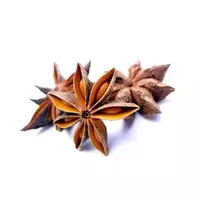Anisetree

Badyan is a species of anise and is a small evergreen tree that grows in the tropics. In another way, it is called star anise, since the fruits of badyan resemble an asterisk in shape, in which there are from seven to twelve rays. Each ray looks like a dark brown boat, hard enough and woody to the touch. In each of these ray fruits there is one shiny seed.
The aromatic properties of badyan are very similar to the smell of ordinary anise, but surpass the latter in subtlety and complexity of the aroma. This spice, which is characterized by a bittersweet taste, goes on sale in the form of whole or broken stars, as well as crushed. If you have never tried this spice when preparing dishes, keep in mind that chefs recommend adding badyan not in a hammered form, but in whole or in pieces, as they differ in the most intense and rich aroma.
Badyan is an integral spice of Chinese cuisine, where it acts as one of the components of the famous five-spice seasoning. It is used in a well-known recipe for Chinese "tea eggs, " as well as in the preparation of dishes from beef or pork, Chinese duck, in goulash and fish soups.
Most often, badyan is used in the manufacture of numerous confectionery products, such as gingerbread, cookies, rugs, pretzels, muffins and others. Russian national cuisine is characterized by the use of this spice not only when baking sweet products, but also for the preparation of compotes, teas, jelly, mousse, sauces, cottage cheese pastes and puddings.
In addition, it is traditionally customary to add badyans with rich taste and useful properties during cooking (especially when using rhubarb), pickles, preservation and pickling. Adding this aromatic spice to a canned dish not only improves its gastronomic qualities, but also promotes the preservation of natural color and at the same time prevents the rapid process of sugaring. Thus, badyan acts as an excellent preservative that allows you to significantly increase the shelf life of products.
As a flavorful seasoning, the badyan is perfectly suited to poultry, meat and fish dishes. While improving the taste and aroma of ready-made meals, this spice gives them a savoury feel while also adding tenderness and softness.
It is known that in many countries, culinary professionals use badyan in the manufacture of some alcoholic beverages in order to give them a specific pleasant aroma. The most famous and popular of these include anise tincture.
badyan 337 kCal
Energy value of badyan (Ratio of proteins, fats, carbohydrates - ju):
Proteins: 18 g (~ 72 kCal)
Fats: 16g (~ 144 kCal)
Carbohydrates: 50g (~ 200kCal)
Energy ratio (bj | y): 21% | 43% | 59%
 Español
Español Français
Français Português
Português Русский
Русский 简体中文
简体中文 繁體中文
繁體中文 日本語
日本語 한국어
한국어 العربية
العربية Türkçe
Türkçe Қазақ
Қазақ Deutsch
Deutsch Italiano
Italiano Українська
Українська
